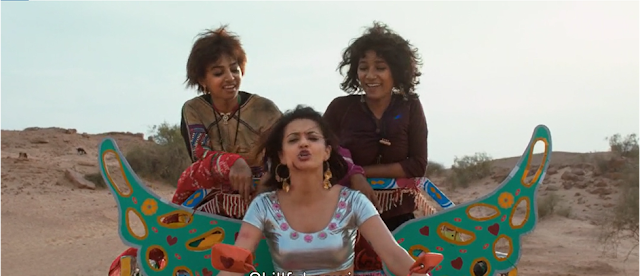On many fronts, Parched under a banal plot rides on narrative crusading for women empowerment and gender equality in a fictional rural setting, where mobile phones are in use but television hasn't arrived. The film makes right noises and fetches accolades for its take on patriarchy, machoism, discrimination and violence (in various forms) faced by the women protagonists - Bijli (a dancer with entertainment company), Lajo (a dutiful wife with an alcoholic husband) and Rani (a single mother). While conforming to all the ingredients of women centric cinema, Leena Yadav has made some minor but influential and pleasant deviations from the traditional script. They will refuse to leave you after the movie.
The
opening act shows Rani and Lajjo boarding a ragged bus at a shanty bus stand in
middle of a vast desert. Both women derive joys in simple acts and are wild as
the wind in each other's company. They are undeterred by system that ascribes
expectations and weighs them down on a daily basis. Perhaps, it is in these
lighter moments, they gather the indomitable spirit to exist and express their
urges. Jovial encounters are amply woven between the three protagonists throughout
the plot and merge well in spite of the intense violent or abusive moments
surrounding men.
The
bold talk about sexual desires, life and cuss words appear cosmetic and do not
carry the weight. The mother lode of transformation is through the individual
moments that serve as tipping points for coming out of taxing situations. The coordinated
timing and amusing bonding of the three protagonists generates an unfathomable
energy. Rani abandons her abusive son, Lajo moves out of violent marriage and
Bijli gathers courage to abandon her handler. It is left to viewer's
imagination to trace the origin of seed for rebellion, but it is masterly anchored
as a mosaic of collective moments of despair, ache and taking baby steps to
defy personal and collective boundaries.
The concluding scene with three eloping on a motor cycle tri-rickshaw is triumphant. In the process Rani discovers that her burnt hair will now have to be cut short and will subject her to ridicule of orthodox folks. At the thought, they break down in a laughter spree and next we see all three cut their hair short in solidarity and as a symbol of non confirmation to the ridiculous expectations. They stop at a crossroad, before deciding to venture their new life and vow to choose their own paths henceforth.
The concluding scene with three eloping on a motor cycle tri-rickshaw is triumphant. In the process Rani discovers that her burnt hair will now have to be cut short and will subject her to ridicule of orthodox folks. At the thought, they break down in a laughter spree and next we see all three cut their hair short in solidarity and as a symbol of non confirmation to the ridiculous expectations. They stop at a crossroad, before deciding to venture their new life and vow to choose their own paths henceforth.
Parched is a story where a whole lot coexists and finds its way through the grey maze of jurassic impediments that restrict women. It reassures the hope that courage in adversity splurges from within. Whether it is individual or collective courage is immaterial. Moments of slow, steady and silent acts finally snowball to liberate from boundaries and barriers. Keeping aside, the tokenism in portrayal of rural culture and attempt to create an assortment of all forms of subjugation, the film has enough magic and fine moments to woo the woman in you. Frankly, framing all men as brutal oppressors does not help much. Their insensitivity, insecurity and desire to crush women all the time appear just a background noise, which could have been dropped easily.

